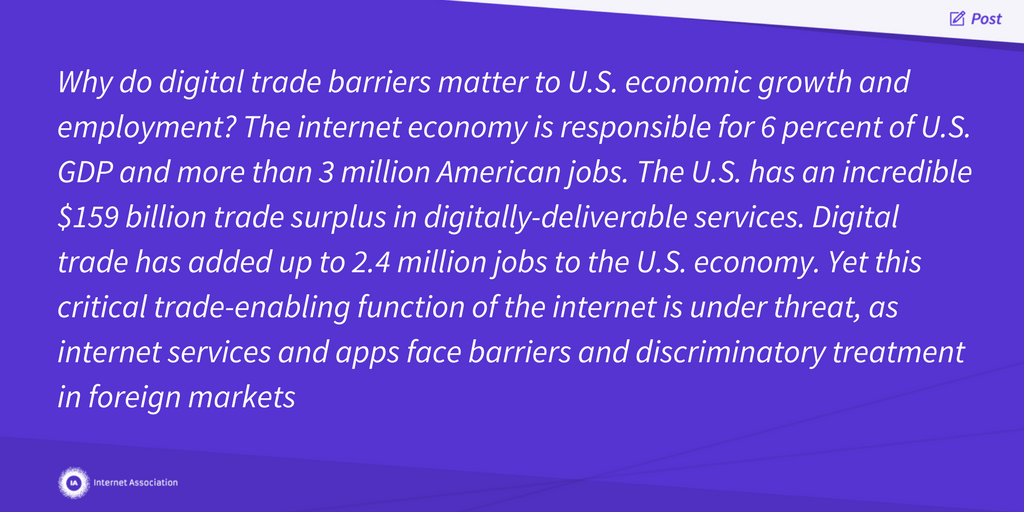
Today, the Office of the US Trade Representative (USTR) released the 2017 National Trade Estimate (NTE) Report. The NTE is the administration’s annual review of significant foreign trade barriers. For this year’s report, IA submitted comments on key barriers in nearly 60 countries that impede U.S. small businesses, manufacturers, and users from leveraging the internet to export their goods and services abroad. We were pleased to see USTR address many of these barriers to internet-driven trade in this year’s report.
Why do digital trade barriers matter to U.S. economic growth and employment? The internet economy is responsible for 6 percent of U.S. GDP and more than 3 million American jobs. The U.S. has an incredible $159 billion trade surplus in digitally-deliverable services. Digital trade has added up to 2.4 million jobs to the U.S. economy. Yet this critical trade-enabling function of the internet is under threat, as internet services and apps face barriers and discriminatory treatment in foreign markets. Countries are increasingly implementing policies that limit the free flow of data, require data be stored in certain locations, use unbalanced intellectual property frameworks to block or limit U.S. exports, apply legacy public utility regulations to online services, or unreasonably impose liability on platforms that power trade for hundreds of thousands of U.S. small businesses. Removing these barriers can unlock significant U.S. economic growth through trade for nearly every sector of the U.S. economy.
IA welcomes this year’s NTE report and is encouraged by the administration’s commitment to digital trade as highlighted by the release of USTR’s “Key Barriers to Digital Trade” fact sheet. For the first time, USTR considered a number of new barriers to digital trade, including “unreasonable burdens on internet platforms for non-IP-related liability for user-generated content and activity.” In addition, USTR identified a number of specific market access barriers they will focus on in the coming year, including EU measures on “ancillary copyright” and “neighboring rights,” EU copyright filtering obligations, unreasonable intermediary liability obligations in countries like Thailand and India, application of legacy regulations to so-called “over-the-top” internet services in Indonesia and Vietnam, Chinese restrictions on U.S. cloud service providers, China’s extensive blocking of legitimate websites, and many other emerging digital barriers.
IA looks forward to working with USTR in the coming year to tackle these critical barriers to digital trade.










